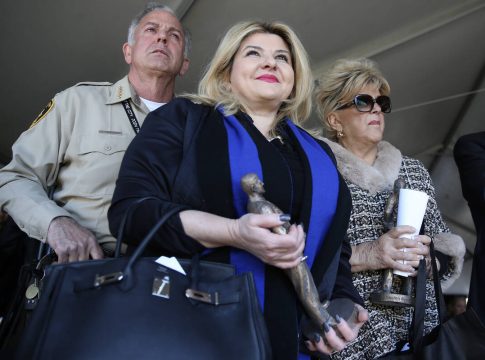Trump Pardons Ex-Councilwoman Michele Fiore, Sparking Controversy Over Fraud Case
April 23 Pardon and Allegations of Misappropriation
In a surprising development, former Las Vegas councilwoman Michele Fiore received a full pardon from President Donald Trump on April 23, effectively absolving her of financial restitution obligations to victims of a significant fraud case. A federal jury had previously convicted Fiore of wire fraud and conspiracy in October, revealing that she had raised over $70,000 intended for a statue honoring fallen Metropolitan Police officer Alyn Beck. Instead of contributing the funds to the statue, testimony revealed that Fiore used the donations for personal expenses, including rent and her daughter’s wedding.
Experts described Trump’s decision as unusual and indicative of a broader trend in his administration, as he has shown a willingness to grant pardons before sentencing and without any express remorse from the recipients. As Michigan State University law professor Brian Kalt noted, "He is definitely doing much more pre-emptive pardoning than we’ve seen in the recent past."
Financial Implications and Expert Commentary
Liz Oyer, a former Justice Department Pardon Attorney, claimed that Trump’s clemency actions have resulted in over $1 billion in debt relief for individuals and companies, emphasizing that Fiore would have owed approximately $70,000 in restitution had the pardon not intervened. The consequences of such pardons, experts assert, mean that once granted, individuals cannot be compelled to repay their debts, significantly impacting victims like the donors in Fiore’s case.
Commenting on the situation, former federal prosecutor Frank Coumou stated, "A jury determined beyond a reasonable doubt she stole this money from innocent donors." This sentiment is echoed by Fiore’s legal team, who acknowledged that it’s unlikely she would have escaped a restitution order had it not been for the pardon.
Donor Reactions and Judicial Consequences
While some donors expressed indifference regarding the acknowledgment of their contributions, others voiced frustration. Harry Mohney, a donor who contributed $2,000, criticized the pardon as "unfair" to those who supported a public memorial. In contrast, attorney David Chesnoff, who donated $5,000, stated his primary concern was the completion of the memorial itself, downplaying the significance of potential restitution.
Fiore’s challenges don’t end here; she is currently facing a suspension from her judicial position due to the fraud case, further complicating her circumstances. The Nevada Commission on Judicial Discipline noted that Fiore had continued to mislead donors even after becoming a judge.
Ongoing Debates and Future Implications
As discussions around Trump’s pardoning approach continue, legal experts remain divided on the implications for victims and the integrity of the judicial system. Jess Marchese, a defense lawyer, called the avoidance of restitution "offensive," emphasizing the need for accountability.
At this juncture, the ramifications of Fiore’s pardon raise significant questions about the nature of justice and the responsibilities of public officials. As the story develops, it continues to resonate within the broader discourse on criminal accountability and the role of executive clemency.
For further updates, reach out to Noble Brigham at nbrigham@reviewjournal.com or follow on X @BrighamNoble.

Focuses on crime, public safety, and regional events.
Bio: Marcus is a community-based journalist passionate about reporting impactful stories that matter most to readers.

